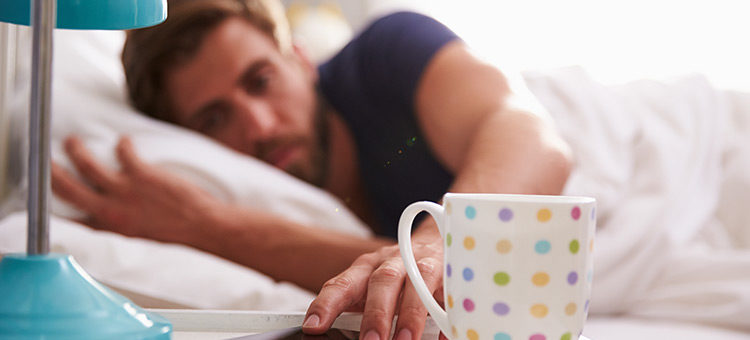
Five Causes for Losing Sleep & What To Do About Them (2024)
We are owned and operated by GoodMorning.com. We hire 3rd-party engineers and use public data to rate mattresses on over 30 criteria that we believe are important. Brands we own—Douglas, Juno, Octave, Logan & Cove, and Novosbed—are reviewed and advertised where indicated. Views expressed here are our opinions only. Full details.
The American Psychological Association says “sleep is so crucial that even slight sleep deprivation or poor sleep can affect memory, judgment, and mood.” If something is keeping you awake at night, finding a solution might just make you a happier, more effective human being. Let’s take a look at some common sleep inhibitors, and what the experts say we can do to alleviate them.
The stress-sleep cycle
Statistically, stress is the number one reason for short-term sleep problems. Often the stressors are based on particular events, like impending exams, the death of a loved one, or problems at home or work. Normal sleep resumes when the stressor has passed. But if you find yourself trapped in a stress-sleep cycle, losing sleep can become a real nightmare.
People who lose sleep often find themselves stressed-out the next day, manifesting as impatience, irritability, and shortness of temper. The stress of the day then inhibits the sleeper from sleeping well the next night. And so on.
What’s the solution:
If you find yourself trapped in this cycle, it might be time to get some help. Sleeping medications — prescription or over-the-counter — can break the pattern of bad sleep. But evidence suggests that cognitive behaviour therapy may be an even more effective sleep-aid than meds.
Cognitive behavioural therapy helps people to rewire the way they think and behave. Learning to think and behave differently is a long-term answer for highly stressed individuals. Reducing lifestyle stress makes it easier to fall asleep. In turn, this will reduce any stress caused by poor sleep, effectively breaking the stress-sleep cycle.
Your mattress
Mattress problems are a major cause of losing sleep. Innerspring mattresses with sagging or loose springs can jab sleepers or negatively affect their spinal alignment. Even memory foam mattresses with great support might not have the right cooling technology, causing you to ‘sleep hot.’
Being too warm or experiencing discomfort can inhibit deep sleep. You might fall into a light sleep on a bad mattress, but your brain will prevent you from enjoying the deepest level of regenerative slumber if your mattress is subjecting you to severe irritants.
What’s the solution:
A cheap mattress topper may help with some cooling or mattress surface problems. Often, however, it may be time to bite the bullet, get rid of your mattress, and invest in a new mattress that will help ensure you get regular restful sleep.
Be sure to select a mattress that suits your sleeping position and comfort tastes. Many companies offer up to 120-night sleep trial, so you can be sure you have made the right choice.
Bedtime procrastination
In 2014, Frontiers in Psychology introduced the world to a growing phenomenon that is causing people to lose sleep. “Bedtime procrastination is defined as failing to go to bed at the intended time, while no external circumstances prevent a person from doing so.” Sometimes it takes a team of academics to give a name to a very human behavior that most of us have experienced.
We all know we should go to bed by a certain time. And know that we would benefit from the extra sleep. But texting, Netflix, a good novel, or video games are just some of the excuses we give ourselves for staying awake.
What’s the solution:
Did any of the above speak to you? Simply recognizing that you are a bedtime procrastinator may be the first step in getting more sleep. Accepting that you are prone to these behaviours will hopefully give you some motivation when it comes to making better choices as the clock nears your bedtime.
Food
Certain foods are not great snacks to indulge in before bed. Perhaps you’ve heard that chocolate can give you nightmares! While the jury’s still out on that, be aware, even the healthiest dark chocolate bars often pack as much caffeine as a cup of coffee. Likewise, a bedtime sandwich is a tasty option, but cured meats, like pepperoni and bacon, contain an amino acid that encourages the brain to release stimulants. Even raw vegetables, like carrots and broccoli, have the potential to keep you awake because they take the body a long time to digest.
What’s the solution:
If you are looking for a healthy nighttime snack, opt for bananas instead. These cheap, tasty fruits contain tryptophan, the body’s natural calming agent. Tryptophan is also found in turkey, a far better choice than cured meats for twilight sandwich fillings. And, if your sweet tooth demands an alternative to chocolate at night, try fresh or dried cherries. They’re packed with melatonin, a sleep-friendly hormone.
Computers, television, and phones
Electronic devices, which already got a mention in our ‘bedtime procrastination’ section, are back again. Where bedtime procrastination was about people trading a good sleep for fun diversions, this discussion is about circadian rhythms. Even folks who have the discipline to go to bed on time may be losing sleep because they’ve been looking at screens that emit blue light in the hours before bed.
Computers, televisions, phones, and even energy-efficient lightbulbs are known for emitting blue light. The clever people at Harvard Medical School put it like this: “At night, light throws the body’s biological clock — the circadian rhythm — out of whack. Sleep suffers. Worse, research shows that it may contribute to the causation of cancer, diabetes, heart disease, and obesity.”
What’s the solution:
The quick and sensible answer to the blue light problem is to put your handheld devices down in the hours before bed. And watch less TV and/or quit the laptop earlier in the evening. But if that is difficult for you, consider using red lights in the evening. This type of light is the least likely to affect your circadian rhythm. Also, adjust your smartphone and computer settings so they emit less blue light.
Finally, make sure the sun is your main source of light. Get plenty of rays during the day. It’s a carefree, enjoyable way to maintain your circadian rhythm.
Related article: 5 More Causes of Sleep Loss & What to Do About Them


